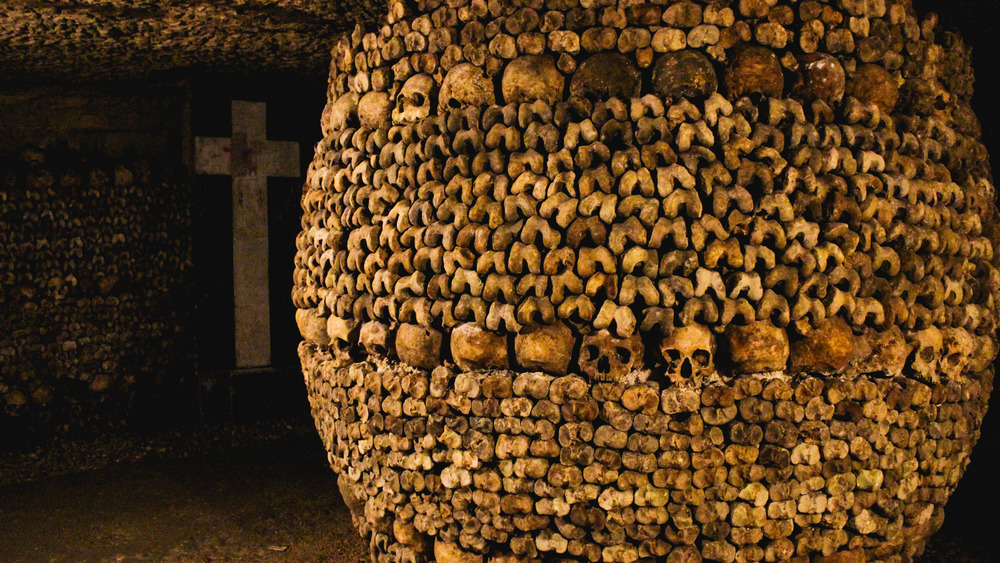The Gruesome Murder That Took Place In The Paris Catacombs
Ahhhh.... Paris. The Eiffel Tower, Notre Dame, the astonishing wealth of irreplaceable art at the Louvre, limitless baguettes and €3 bottles of wine drunk in parks, droves of smokers slouching near the Seine river looking tragically and fashionably bored, and, most romantic of all: an underground, 186-mile-long, fetid and soundless labyrinth replete with the bones of 6 million dead. The Catacombs of Paris, an "empire of death," as Smithsonian Magazine calls them, grew out of a 17th century need to simply keep up with all the deceased. The tunnels had existed since the 13th century, so the city decided to put them to use. In 1809, per Les Catacombes de Paris, the catacombs were opened to the public as a tourist site.
Tons of people have gotten lost in those unsanctified halls of the damned, especially if they sneak into restricted, low-ceilinged, and flooded areas (which comprise most the catacombs). As recently as 2017, Teen Vogue reports that a 16- and 17-year-old were lost for three days before being found by search dogs. The year prior, a bikini-wearing surfer carried her board into the catacomb's lowest, restricted levels to "surf a grave," per Local Paris. French Revolution doorkeeper and hospital guard Philibert Aspairt died in the catacombs after getting lost in 1793, as a Reddit thread outlines, and it took 11 years to find his body.
So sure, what place more apropos than amongst the dead, where the walls are literally composed of bones, to commit a murder?
More broken skulls added to the dead
In an 1845 article, The London Journal recounts a slaying that occurred in the catacombs, grisly and savage enough to suit its environment.
As the story goes, a man named Alexandre Francornard, an ill-mannered but "very handsome" guy, was courting a wealthy widow in Paris. The widow had a 3-year-old child with her deceased husband and had taken in interest in Francornard during her two-year mourning period. The night her mourning finished, she and her daughter went to visit Francornard at work. His job? Torchbearer for people who wanted to ramble through the catacombs, which until 1830, could be done without restriction. The widow and her daughter never emerged. The next day, Francornard fled Paris.
Investigators discovered the widow and her daughter in the catacombs, dead. The widow had been beaten to death with a wooden plank, and the child (apologies — this is actually really terrible) had been swung by her feet so that her head smashed open against some rocks.
Six months later, Francornard was discovered 190 miles away from Paris in a village called La Recousse. He was in a pub, dressed as a laborer, when a police officer asked him for a light. The officer noticed something in his pocket: a letter given to Francornard by the widow, with her name on it. Francornard was arrested, taken back to Paris, and beheaded on March 7, 1825. Why had he kept the letter? We'll never know.

